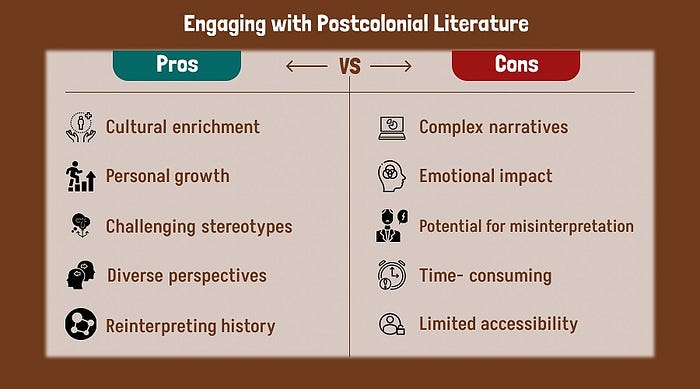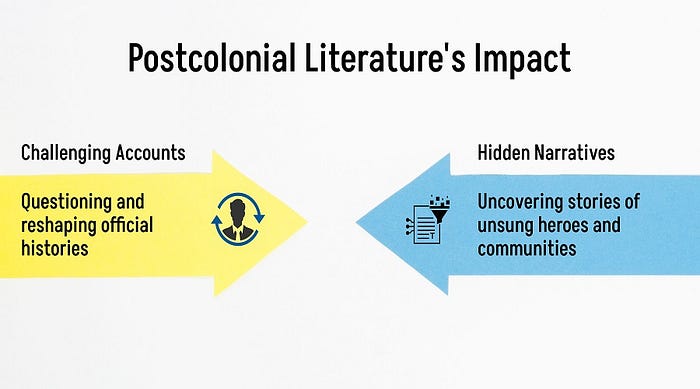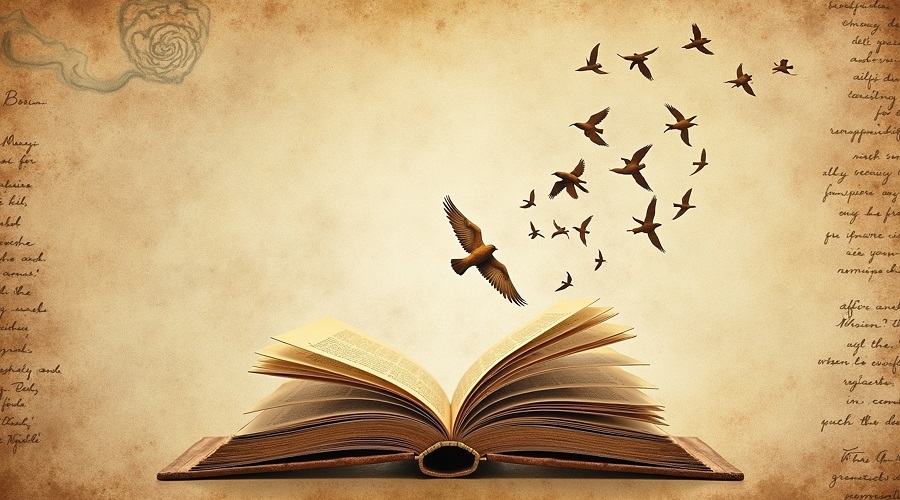In your experience, have there been times when it felt like an important chapter of your life story just couldn’t fit into the tale? Imagine a colorful mosaic where the cultural roots blend with the struggles facing the ancestors and your identity. Postcolonial Literature is about a deep journey into reclaiming identity, rewriting history and shouting the silenced voices. What a delight it would be to explore and celebrate such histories!
Discovering Yourself Through Postcolonial Literature
To explore it is no mere activity of page-turning; it is an experience of metamorphosis whereby one is summoned to think back on who they are. One could visualize the narrative where the design of the story blends myth and folklore with native languages and personal memories to create a vivid tapestry of belongingness.
Writers such as Chinua Achebe in Things Fall Apart and Salman Rushdie in Midnight’s Children redefine the very canvas of literature by inviting history to be examined with another set of eyes.
- Embracing Your Roots: Think about all those wonderful childhood stories, all the mind-blowing stuff you heard or experienced about the legends found in your region or heard from the interesting older people. That is what this literature is doing to you: plugging into that rich culture. Almost like finding that one, perfect piece of your jigsaw puzzle so you can see what it looks like and what it reveals about your true self and origins.
- Breaking Down Stereotypes: Have you ever felt bound by a stereotype, or that there is really no one understanding you? it asks you to celebrate multidimensional portrayals and debunk simplistic narratives. It furthers complex multidimensional stories that resist stereotypes in full-blooded ways and offer a fuller apprehension of different identities. For example, Wide Sargasso Sea and other novels revise former classics creatively to highlight the obscured voices of others.

Rewriting History with a Personal Touch
Standard-issue narratives often convey a single version-truth that can make you feel both neglected and misrepresented. However, it shows another way of looking back at history because it voices the realities of those who dealt with the implications of the colonial era.
- Unearthing Hidden Narratives: Imagine discovering unbelievable history of the unsung heroes who made really great contributions that have gone unnoticed by the mainstream narrative. It is the genre that celebrates such narratives, proving that history is not only of famous leaders or great battles, but also of communities, their struggles, and their extraordinary resilience. You feel like being part of a discourse that transcends into the future.
- Challenging Old Accounts: Encounters with it really do turn the world upside down: The writers ask you to stand up against the consensus and examine how history may have been perceived uniquely by those at the margins. What a moment! A moment that allows you to topple and recreate your own narrative!

How Postcolonial Literature Sparks Change
It is not only a narrative; it is an agent of change. Go through the text, and let it inspire you to think critically, speak and most importantly act about issues that really concern you.
- Language as a Tool for Freedom: Imagine the ability of words to express the indescribable strength you hold within. Great writers weave traditional dialects in with modern slang to shake tradition and challenge old colonial narratives! Bringing something new to the table; this innovative combination allows a thinker to view language as not just a means to communicate but as an active tool to embrace and celebrate one’s culture.
- Engaging and Dynamic Narratives: The craft of storytelling in this Literature makes it really worth expressing Broken. The text here has non-linear narratives with strong imagery and that much symbolism, inviting you to uncover something new and exciting every time you turn the page. Imagine a tale going from the past to the present, in which every scene seems to be an unravelling mystery that eventually leads you to a deeper understanding of your own journey.
- Fostering Meaningful Conversations: All this Literature tells you stories. These go deeper into the issues of things like racism, loss of culture, and phenomenal resilience, making one think about society and one’s role therein. They inspire you to express your ideas and spark debates with your friends and among others for change to happen in your community.
Final Thoughts
Postcolonial Literature is really going to help you find your roots and identity again in a world that can so often feel lost or disconnected. It lets you reclaim your identity, rewrite your story and make your voice heard loud and proud. Each page calls to you to enter into it, think about it and relate it to your own unique tale.
Why not take a moment to dip into one of these books? Get yourself set to swim in the ocean of live emotions! It is not just about reading: This Literature is an adventure that invites the reader to find and travel through various perspectives.
I would really like to consider your view on how literature could be a tremendous vehicle for reclaiming identity and for reinterpreting history! Has there ever been this moment for you, when you closed the book and walked away with a completely changed view on your personal journey? Drop your journey in the comments below, and let us start the conversation together!
If you are exploring a subject in English or finding it difficult to select an appropriate research topic, our expert team is here to support you don’t hesitate to reach out and contact us today.
FAQs
Q1: What exactly is Postcolonial Literature?
A: This literature delves into the aftermath of colonialism in various cultures and societies by unraveling dense history and identity layers. It displaces the conventional histories and speaks to the voices and experiences that were previously negated and thus gives an opportunity for people to reconnect and embrace their culturally heritage and true identity.
Q2: How does Postcolonial Literature help in reclaiming identity?
A: This literature takes you to both shared and personal histories by relooking at historical events with a fresh appreciation in cultural terms. It engages with folklore, indigenous languages, and personal experiences to engage you toward apprehending and celebrating your true self.
Q3: Can you provide examples of Postcolonial Literature?
A: You agree! Chinua Achebe’s Things Fall Apart and Salman Rushdie’s Midnight’s Children are truly watershed texts for this literature, embodying an erasure and an expression of identity and history with such strength. These narratives mix local traditions and customs with great rebellion against the old ideological colonial perspective to build relatability and utter fascination.
Q4: What impact does Postcolonial Literature have on society today?
A: This literature awakens the most intense debates about the articulation of history, identity, and cultural diversity. It inspires one to overthrow the status quo and see a wider view of history. This enriches one’s perspective on the world at large thereby bringing about change in the society by amplifying and projecting voices that have long gone unheard.





Comments